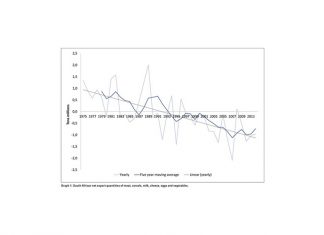Themba Rikhotso was appointed as CEO of Land Bank in April 2023 and has already made strides in ensuring that the bank is ‘fit for purpose’ and on a trajectory to become a leader in agricultural financing. SA Graan/Grain spoke to him about his vision for the bank and his plans to overcome the many challenges associated with agricultural financing.
Born and raised in a village near Giyani in Limpopo, Rikhotso’s family was subsistence farmers, planting grain and raising cattle. After school he obtained his Bachelor of Commerce in accounting and information systems from the University of KwaZulu-Natal and later a Masters of Business Leadership from Unisa.
Before joining Standard Bank to eventually become executive head of Sales and Transactional Banking, Rikhotso honed his skills by developing banking solutions for several banks in countries like Mozambique, Zimbabwe, Malawi, Tanzania, Uganda and Swaziland.
His first introduction to agricultural financing was with the Rabobank Australia & New Zealand Group which is part of the international Rabobank Group, the world’s leading specialist in food and agribusiness banking.
Challenges facing agricultural financing
Even though he admits that there are many challenges when it comes to agricultural financing, he is not disillusioned. ‘I believe that Land Bank has the potential to be a strong leader in financing this sector. No other bank is focused solely on agriculture and we have worked hard to acquire the necessary capacity and skills within the bank to develop solutions to these challenges.
‘Our biggest challenge, I believe, is to provide patient and affordable financing in a sector that is unlike any other. The seasonal characteristic and the low margins associated with farming makes it a difficult sector to finance sustainably. The sector’s non-performing loan rates are high and so are the decline rates for farmers due to constrained repayment ability. Add to this volatile commodity prices and growing climate-related risks and it is not difficult to see that we need tailor-made solutions for the sector, which I believe Land Bank has the capability and capacity to do.’
Rikhotso is convinced that agricultural financing faces many of these challenges because of a lack of support. ‘In Europe up to 50% of a farmer’s revenue comes from government subsidies, this includes insurance subsidies. South African farmers do not have that luxury.’
When it comes to ‘new era’ farmers, Rikhotso thinks that access to productive land remains the biggest challenge. ‘These farmers often do not have the equity and collateral to secure financing. New era farmers are responsible for 10% of South Africa’s agricultural output and a third of cattle farming is in their hands. Communal ownership and leasing land from government have proven to be challenging for commercial farming. These farmers often struggle to secure security of tenor on leases and remain financialy sustainable.’

Targeted solutions
More than 80% of the Land Bank’s clientele are commercial farmers and Rikhotso says the bank is currently implementing strategies towards restructuring its operating model to better assist producers. ‘In addition to financing current and new clients, our aim is to facilitate solutions for defaulting clients who are struggling to service their loans. To this end we have set aside half a billion rand to assist in the restructuring of loans.’
When it comes to new era farmers the Land Bank has several strategies and programmes in place.
SA Graan/Grain previously reported on blended finance solutions (which includes the Agro Energy Fund) spearheaded by Land Bank. ‘We are currently working with government to address access to land issues; we are also speaking to input suppliers regarding solutions to make inputs available at lower costs. We have a team working with big off-takers to ensure that these farmers have market access. Grower programmes for specific commodities are already in place. I believe that we have the capability in South Africa to make agriculture more inclusive, but there is insufficient coordination of funds and I see the Land Bank taking up that role of coordinating initiatives and pulling funds together.
‘In the end our aim is to continue to service all segments of agriculture.’
Land Bank’s role in agriculture
Rikhotso’s vision is to see Land Bank become a leader in agricultural financing and he is certain that the bank will take on more of a coordinating role as it works towards sustainable solutions for affordable financing. ‘In five years’ time, I would like to see the Land Bank function as an orchestrator of various activities across the agriculture value chain, as we set up an eco-system of partnerships with commodity forums, farmer organisations, off-takers and input suppliers. We are developing holistic solutions and the strategies in place are solid. We have restructured our operating model and our aim is to move closer to our clients.’

















